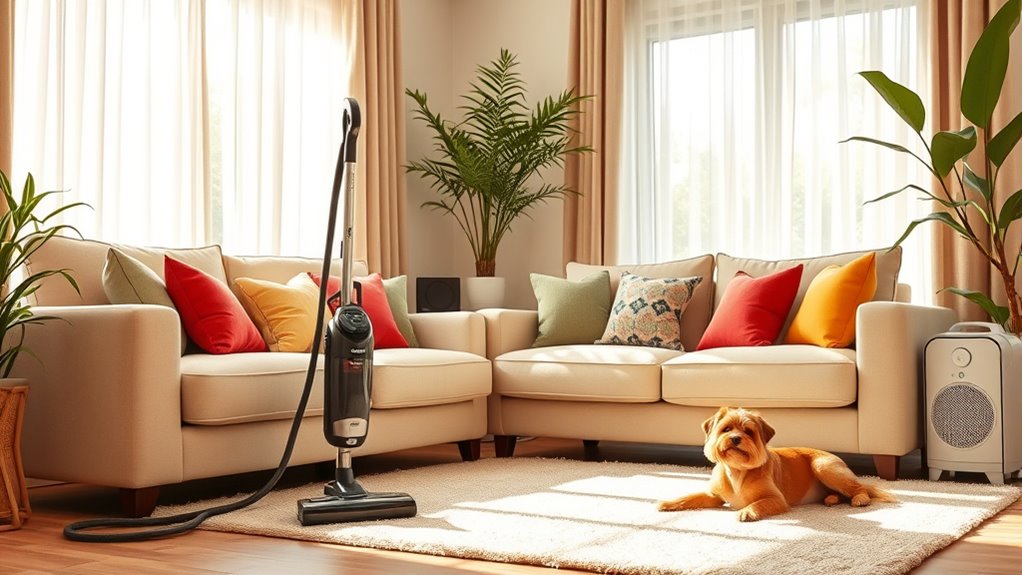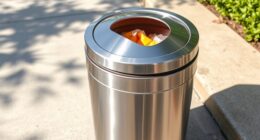To tackle pet odors at home, I recommend deep cleaning with enzyme-based cleaners that break down smell-causing molecules, along with regular vacuuming using HEPA filters. I also keep my pet areas well-ventilated and wash bedding and toys weekly. Establishing consistent cleaning routines and creating designated pet spaces help prevent odor buildup. If you want to discover more effective tips on cleaning and habits, you’ll find plenty of helpful ideas to try.
Key Takeaways
- Use enzymatic cleaners and HEPA vacuuming regularly to target deep pet odors.
- Establish designated pet zones and wash bedding weekly to prevent smell buildup.
- Maintain good ventilation and employ air purifiers for improved indoor air quality.
- Regularly groom and bathe pets to reduce odor sources and promote freshness.
- Combine consistent cleaning routines with odor-neutralizing products for effective odor control.

Have you ever noticed that despite your best efforts, pet odors seem to linger in your home? It’s frustrating, isn’t it? No matter how often you clean or vacuum, that unmistakable smell can stubbornly stick around. That’s where effective pet odor removal techniques come into play. I’ve found that the key isn’t just cleaning after the fact but also taking steps to prevent odors from becoming a problem in the first place.
Pet odors can stubbornly stick around despite regular cleaning efforts.
First, understanding how pet odors seep into your home helps. They aren’t just surface issues; they penetrate deeper into carpets, furniture, and even the air. Regular vacuuming with a HEPA filter can help, but I also recommend using enzymatic cleaners designed specifically for pet odors. These break down the molecules responsible for bad smells, rather than just masking them. When it comes to pet odor removal, I’ve learned that consistency is essential — a one-time cleaning won’t cut it. Instead, incorporating routine cleaning sessions with the right products keeps odors at bay.
Beyond cleaning, odor prevention techniques are just as important. I’ve found that establishing a designated pet area helps contain smells. Regular bathing and grooming are essential, too — clean pets produce fewer odors. I make it a point to wash their bedding and toys weekly, as these tend to trap smells over time. Using odor-neutralizing sprays or diffusers can also improve indoor air quality and reduce lingering smells. Additionally, air purification systems can help remove airborne particles that contribute to persistent pet odors.
Another tip I swear by is managing your pet’s diet and health. Sometimes, bad odors are linked to allergies or digestive issues, so consulting with a vet can help address underlying causes. I’ve also noticed that keeping the home well-ventilated makes a big difference. Opening windows or using air purifiers can help circulate fresh air and remove trapped odors.
In the end, maintaining a fresh-smelling home with pets involves a combination of diligent cleaning and proactive odor prevention. It’s about creating an environment where pet odors don’t become a permanent fixture. By implementing these techniques consistently, I’ve seen a marked improvement—not just in smell but also in how comfortable and inviting my home feels. It’s worth the effort because a fresh-smelling home is a happier, healthier space for everyone, including our furry friends.
Frequently Asked Questions
Can Certain Houseplants Help Eliminate Pet Odors Naturally?
Yes, certain houseplants can help eliminate pet odors naturally. I’ve found that plants like peace lilies and snake plants have good plant efficacy in absorbing odors and improving air quality. They act as natural remedies, reducing unpleasant smells without harsh chemicals. Just make sure to choose non-toxic options if your pets tend to nibble on plants. Incorporating these into your home can make a noticeable difference in freshening the air naturally.
Are There Specific Air Purifiers Best Suited for Pet Odor Removal?
Absolutely. I recommend air purifier models with HEPA filters and activated carbon layers for effective odor elimination. Brands like Dyson, Blueair, and RabbitAir offer models specifically designed for pet odors, capturing airborne particles and neutralizing smells. These purifiers work continuously to keep your air fresh, making your home more comfortable. I’ve found that investing in a quality air purifier truly helps maintain a clean, odor-free environment for both you and your pets.
How Often Should I Replace My Pet’s Bedding to Prevent Odors?
I recommend washing your pet’s bedding at least once a week for effective pet odor prevention. Frequent bedding washing reduces bacteria and dampness that cause odors to build up. If your pet tends to get dirty or has allergies, consider washing even more often. Regular cleaning not only keeps odors at bay but also promotes a healthier, fresher environment, making your home more comfortable for everyone.
Do Certain Fabrics Trap Odors More Than Others?
Certain fabric types, like plush or synthetic materials, tend to trap odors more than natural fibers such as cotton or linen. I’ve noticed that plush and fleece fabrics retain pet odors longer because of their dense fibers and high odor retention. To keep your home smelling fresh, I recommend choosing breathable, natural fabrics for pet bedding and regularly washing them. This helps minimize odor buildup and keeps your space cleaner.
Can Dietary Changes Reduce Pet Odor Emissions?
Yes, changing your pet’s diet can help with odor reduction. I’ve found that a high-quality, balanced pet diet reduces the intensity of odors emitted. When I switched to a specialized formula, my home smelled fresher, and my pet’s coat improved too. It’s worth consulting your vet to find the best diet for your pet’s needs, as dietary adjustments can make a noticeable difference in controlling pet odor emissions.
Conclusion
Removing pet odors can feel like a never-ending battle, but with patience, consistency, and the right techniques, you can keep your home fresh and inviting. Remember, “A clean home is a happy home,” and it’s worth the effort. By staying proactive with cleaning and understanding your pet’s habits, you create a healthier environment for everyone. Keep at it—your efforts will pay off, and you’ll enjoy a fresher, more comfortable space for you and your furry friend.








